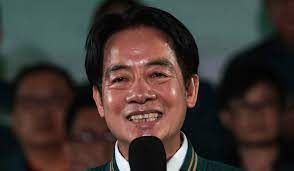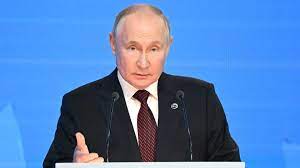Resolute and assertive, Lai Ching-te, a seasoned politician known for his pragmatic approach to Taiwan’s independence, is set to assume the role of the democratic island’s next president, steering through a challenging relationship with China.
The 64-year-old Harvard graduate secured victory in Saturday’s election, pledging to safeguard Taiwan’s democracy and resist Beijing’s territorial claims. His win marks an unprecedented third consecutive term for the Democratic Progressive Party (DPP), and in his victory speech, Lai celebrated it as a “victory for the community of democracies.”
“We are telling the international community that between democracy and authoritarianism, we will stand on the side of democracy,” he declared.
Lai commits to continuing outgoing President Tsai Ing-wen’s policies of bolstering Taiwan’s military capabilities as a defense deterrence against potential Chinese aggression. Despite recent moderation in his outspoken approach, Beijing views him as a “stubborn worker” for Taiwan’s independence and a “saboteur of peace,” warning of potential conflict and decline for the island.
In contrast to Taiwan’s political elite, Lai, born in 1959, emerged from humble beginnings. Raised by his mother in a rural hamlet in New Taipei City after his coal miner father’s early death, he returned to Taiwan after graduating from Harvard. Inspired by China’s military threats during the Third Taiwan Strait Crisis in 1996, Lai entered politics to safeguard Taiwan’s democracy.
His political journey includes roles as a lawmaker, mayor of Tainan, and premier, eventually serving as vice president to President Tsai Ing-wen, whom he will succeed. During Tsai’s tenure, relations with China deteriorated, and Lai’s vocal stance on Taiwan’s independence has sparked concerns about his approach to China.
As premier, Lai was more assertive than Tsai on the issue of independence, raising questions about his handling of China relations. Observers speculate on his ability to maintain a cautious and moderate approach in line with Tsai’s path.
Amanda Hsiao of the International Crisis Group notes, “The question will be to what extent Lai can stick to the cautious and moderate pathway carved out by Tsai.” Meanwhile, Sarah Liu from the University of Edinburgh anticipates a Lai administration continuing a path of “less economic reliance on China” and strengthening Taiwan’s international standing to consolidate its democracy.
In a campaign ad, Tsai acknowledged Lai’s fierceness, emphasizing the importance of protecting Taiwan’s democracy. Lai’s pragmatic yet assertive leadership style will likely shape Taiwan’s stance on the international stage, navigating the delicate relationship with China.




